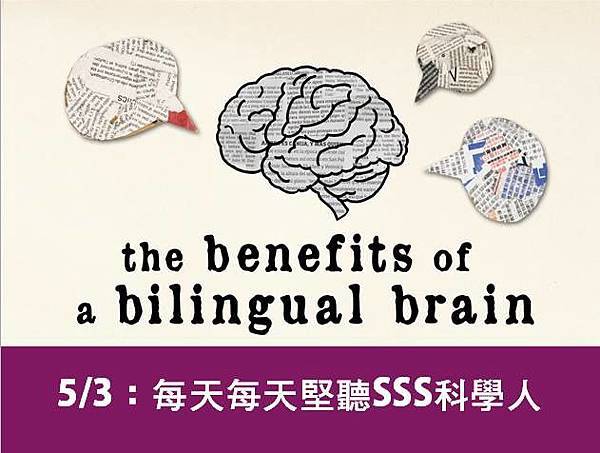 今日主題:Publication Bias May Boost Findings for Bilingual Brain Benefits 出版偏見或“虛增”了雙語能力對大腦的好處
今日主題:Publication Bias May Boost Findings for Bilingual Brain Benefits 出版偏見或“虛增”了雙語能力對大腦的好處
 洪欣老師推薦:托福聽力最好的課外教材:60-Second Science
洪欣老師推薦:托福聽力最好的課外教材:60-Second Science 康康精選托福會考的主題,堅持每天精聽一定會進步的哦!!
康康精選托福會考的主題,堅持每天精聽一定會進步的哦!!
 建議方法:
建議方法:
1. 先聽兩三遍 (不看文稿)
2. 再一句一句聽寫 (每句都要聽寫數遍,直到寫出85%以上的字)
3. 最後check文稿,看哪聽不出來,單字沒背過,還是發音不熟。
4. 堅持天天聽,就能每天進步哦。
 MP3音檔 (按右鍵可下載聽):喜歡的同學,幫忙推或按讚哦~~
MP3音檔 (按右鍵可下載聽):喜歡的同學,幫忙推或按讚哦~~
http://online1.tingclass.net/voaspe/2015/20150119sa_mind.mp3
🎁 只有音檔怎夠,聽不懂地方,不用怕,康康幫你準備好中英文稿了:
🎁 中英文稿:
Over the past 10 years, many scientific papers have shown that speaking more than one language can convey some cognitive rewards. For example, bilingualism seems to boost the brain's ability to focus, plan, and perform certain mentally taxing tasks. But a few papers show no such advantages.
過去10年,許多科研文章表明會多種語言在傳達認知方面有一定的優勢。例如,懂雙語似乎有助於大腦集中註意力,提高組織計劃及執行某些勞神任務的能力。但也有一些文件顯示懂雙語並沒有這種優勢。
Now a study finds that research that challenges a bilingual benefit is less likely to be published than studies that find one. This party pooping, or fiesta-foiling, finding is in the journal Psychological Science.
現在一項研究發現,那些質疑雙語能力的好處的研究跟支持它的比起來,被發表的可能性要小。這場掃興的或者說是攪局的發現刊發在《心理科學》雜誌上。
Researchers compared studies presented at conferences to those actually accepted for publication. Of the 104 meeting abstracts they examined, about half supported a bilingual advantage and half challenged or failed to find one.
研究人員將在學術會議上提出來的研究同那些真正被出版社發表的研究做了比較。在他們調查的這104個學術文摘中,約半數支持雙語能力有優勢,另有一半則對其表示質疑甚至表明沒發現這種優勢。
But when it came to publication, 63 percent of the bilingual boosting studies made it into a scientific journal, as opposed to 36 percent of the studies with null findings.
但在出版物中,63%支持雙語能力優勢的文章出現在了科學雜誌上,持另一觀點的研究則只有36%被發表。
The data do not address whether the bias toward affirmative results comes from the journal editors and reviewers or from the scientists themselves. And they don't suggest that bilingualism offers no advantages. Regardless of brain function, there exist undeniable social benefits to having two tongues versus just one.
這些數據並沒有表明這種偏向“支持方”的結果,是來自雜誌的編輯和審稿人還是科學家們本身。它們也並不能說明雙語能力沒有優勢。且不論對大腦功能影響如何,懂兩種語言確實比只會一種語言擁有不可否認的社會效益。



 留言列表
留言列表
